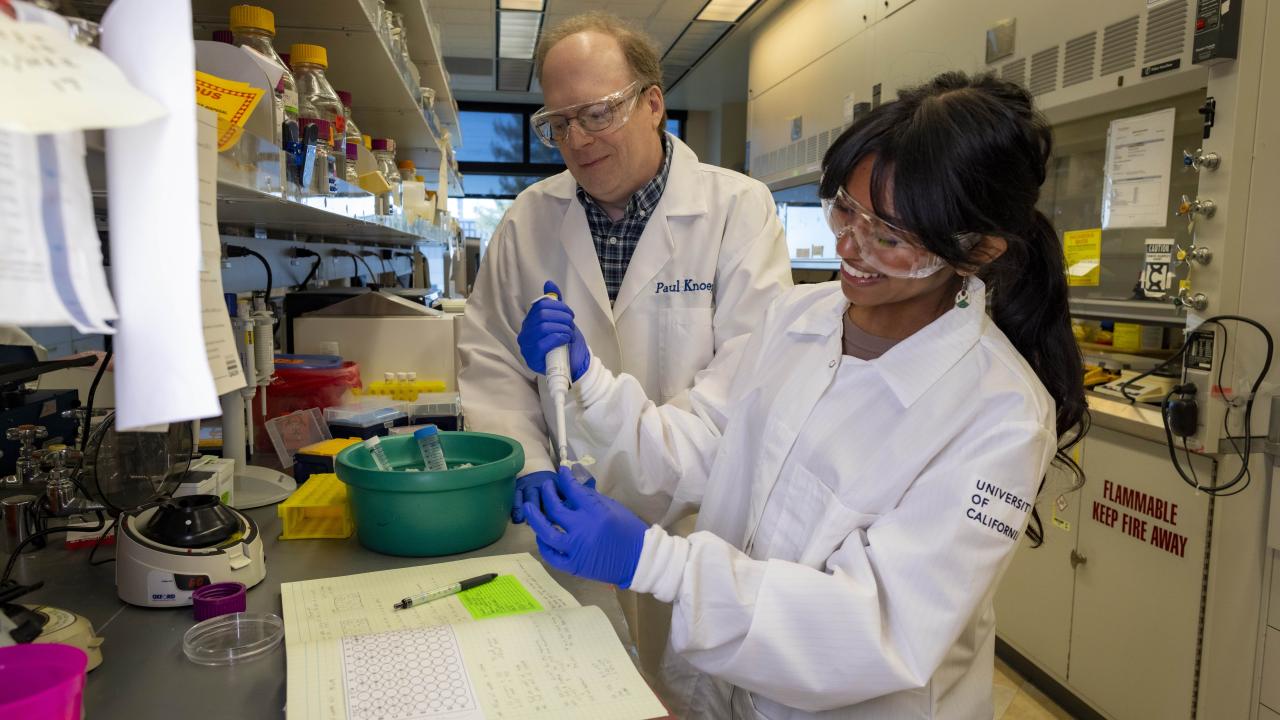Corrected Oct. 2 to revise the number of records of invention.
UC Davis has experienced a surge in records of invention (ROIs), marking a strong rebound in research innovation. The university filed 187 ROIs in the fiscal year that ended June 30, 2025, up from 140 the prior year, a 34% increase that reverses a multiyear decline dating back to fiscal 2021.
An ROI is a confidential university document used to formally capture an invention, its details and inventors, serving as the initial step in evaluating the potential for patentability and commercialization. On average, anywhere from 10% to 25% of ROIs eventually become patents.
Over 90% of this growth in in filings is attributed to the Innovation and Economic Development Office and its UC Davis Health Ventures team, which collaborated with university partners to double ROI filings from the UC Davis School of Medicine in the prior year. As a result, the School of Medicine’s share of campus-wide ROIs grew from one-third to nearly half, underscoring its expanding role in UC Davis’ innovation ecosystem.
“This surge in records of invention reflects the growing strength of our university as an innovation leader,” said George Baxter, chief innovation and economic development officer for UC Davis. “It’s a strong signal that more of our research is poised to solve real-world problems.”
Innovation in high-impact fields
The numbers tell only part of the story. Many of the new ROIs are in high-impact fields such as cell and gene therapy, neuroscience, oncology and food as medicine, areas with significant clinical demand and commercial potential. This positions UC Davis researchers for future funding opportunities, especially as federal agencies increasingly prioritize research with clear translational and societal value.
“We’re seeing our research translate into value that extends beyond the lab,” said Dr. Bruce Hall, interim vice chancellor of human health sciences and chief clinical officer for UC Davis Health. “The numbers are exciting, but what matters most are the people behind these inventions and what they represent for the future of the university and our mission to discover, educate and improve human lives.”
New contributors, renewed momentum
More than 70% of the ROIs secured by Health Ventures this fiscal year came from first-time lead innovators, reflecting the impact of targeted outreach and increased support for faculty, graduate students and postdoctoral researchers across disciplines. Among returning inventors, the average time since their last submission was three years, evidence that lapsed participants are re-engaging.
Health Ventures also spurred invention activity on both the Davis and Sacramento campuses. Their efforts led to records of invention being filed from 20 departments across the School of Medicine, School of Veterinary Medicine, College of Engineering, College of Biological Sciences and College of Agricultural and Environmental Sciences. This cross-campus engagement supports the Innovation and Economic Development Office’s broader strategy of building a collaborative innovation pipeline.
Notable examples of UC Davis faculty and researchers who filed ROIs this past year, include:
- Natalia Vapniarsky-Arzi (School of Veterinary Medicine), who developed an off-the-shelf CRISPR-engineered cartilage material designed to avoid immune rejection, offering new potential in orthopedic and regenerative therapies.
- Paul Knoepfler (School of Medicine) and his team, who created engineered cell banks that model glioma, accelerating cancer drug discovery and industry collaboration.
- Kyle Fink, Brian Fury and Julian Halmai (School of Medicine), who developed a faster, more cost-effective manufacturing process for gene therapy using adeno-associated viruses, streamlining the path to clinical application.
“The Health Ventures team was instrumental in helping us translate our research,” said Paul Knoepfler, who runs the Knoepler Lab in the Department of Cell Biology and Human Anatomy. “They met with us to learn about our goals and helped us craft a product innovation concept from the raw scientific research.”
A culture of commercialization
The increase in ROIs reflects a broader cultural shift. UC Davis, through the Innovation and Economic Development Office, has invested in mentorship, early-stage funding and commercialization support to guide researchers from discovery to application.
“The growth in ROIs represent more than numbers, they show that we’re building a culture of innovation,” Baxter said. “We’re turning hesitation into momentum and helping our research community deliver meaningful solutions to society.”
About UC Davis Health Ventures
UC Davis Health Ventures is the human health innovation and commercialization hub within the Innovation and Economic Development Office. Based at Aggie Square, it connects researchers, clinicians, investors and industry partners to accelerate the development of human health-focused discoveries into market-ready solutions. Health Ventures oversees a collaborative network supporting translational funding programs, industry partnerships, intellectual property commercialization and operates a dedicated Health Venture Studio and Fund. By fostering collaboration across campus and the Sacramento region, it helps advance breakthrough technologies from the lab to the real world.
To learn more or explore partnership opportunities, contact UC Davis Health Ventures at hs-ventures@ucdavis.edu.
Media Resources
Media Contact
Phil Wade, communications manager, UC Davis Innovation and Economic Development Office, 530-757-8753, pmwade@ucdavis.edu
